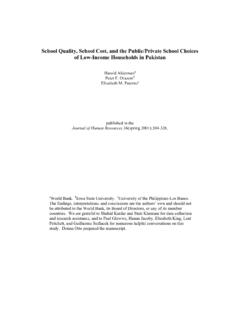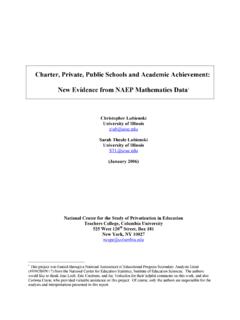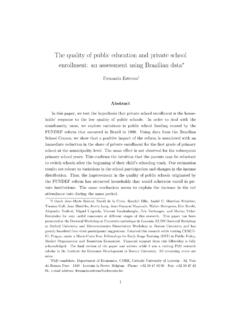Transcription of Public Funds for Private Schooling in New Hampshire
1 Public Funds for Private Schooling in New Hampshire :MYTHS AND FACTSDECEMBER 2017authored by Jody S. Underwood, Funds for Private Schooling in New Hampshire : MYTHS AND FACTS 2 Actually, special education schools are all Private , and border towns have always sent their kids to Private schools in other dollars can t be spent on Private schools!Executive SummarySince the 1960 s, towns like Hampton have paid for child benefit services , equipment and even physical education classes at religious Private schools that are attended by their , not religious mean except for publishers, heating oil companies, food providers, content providers, educational web sites, professional development, some special education schools, and so on?Okay, but at least tax dollars aren t going to for-profit institutions .. right?Now we can have a discussion instead of an argument.
2 Want to go get a beer?I may have to rethink this whole school funding Funds for Private Schooling in New Hampshire : MYTHS AND FACTS 3 IntroductionIn 2016, I watched with astonishment as a New Hampshire Assistant Attorney General stood in court and said to the judge that Public Funds cannot be spent to send Public school children to Private schools. 1 It is not clear what Public school children are, but if she meant that statutes prohibit towns from using tax money to send students to Private schools, she is mistaken. This is one of a number of inaccurate statements you may have heard about the Public financing of education in New Hampshire . You may also have heard people say that tax dollars can t be used to send students to religious schools or to pay for education services from for-profit organizations. People raise these arguments all the time in discussions about school funding, but it may surprise you to learn that they are myths and all untrue all these things have been going on in New Hampshire for a very long time.
3 We can only have a productive conversation about how tax dollars should be spent once we know what really happens, and how, and why. This report will give you information, in the form of examples and supporting legislation, to help you avoid being side-tracked when these arguments are raised. It explains how three New England states and their local governments have historically used tax dollars to pay for Schooling and related services from Private institutions including religious schools, for-profit organizations, and even schools in other states. It also addresses the mistaken notion that Public schools are not allowed to turn away students. MYTH 1: TAX DOLLARS CANNOT BE USED FOR Private : New Hampshire tax dollars have long supported students attending Private may have heard that the inclusion of Private schools in school choice programs is some kind of new assault on traditional education.
4 But the three northern New England states of New Hampshire , Vermont, and Maine have all been using the school choice practice of town tuitioning for well over a That is, when no school in a district provide particular grades, students in those grades are sent to other schools, which may be Public or Private , and may even be located in adjacent states. The district pays all or part of the tuition for these schools. There are some differences in how the three states implement town tuitioning: how long it has been around, who chooses the set of schools, and how much tuition the town pays. In addition, many special education facilities are Private schools. 1 Transcript of New Hampshire Department of Education v. Croydon, Sullivan County Superior Court, March 9, Underwood, & Konieczny, C. (2016). How New Hampshire provides small towns with access to schools. Granite Institute. Public Funds for Private Schooling in New Hampshire : MYTHS AND FACTS 4 HOW LONG HAS TOWN TUITIONING BEEN IN PLACE?
5 In New Hampshire , local control has been the standard since districts were initially established in 1885, and tuitioning was formally established in 1901 for any district that did not offer all K-12 However, tuition contracts with Private schools, including those in other states, have been used in New Hampshire since at least as far back as New Hampshire districts could send their children to Private schools until 1949, when a change to one statute limited the choice to Public schools and Public academies (independent schools that agree to follow the state s curriculum and testing requirements), while other statutes still granted school districts the power to make contracts with other literary institutions. 5 Since the state statutes related to the practice of sending students to Private schools were somewhat ambiguous, the legislature enacted a law in 20176 to clarify that it is legal for school districts to make contracts with non-religious Private schools as part of their tuitioning programs.
6 In Vermont, town tuitioning started in 1869. Maine has had town tuitioning since 1873, which was updated in 1909 when the state said that towns without a high school must pay tuition at an approved Public or Private secondary school . In Maine, religious schools were included until NH RSA 194:27, Tuition: NH RSA 194:22, Contracts with schools: NH SB 8-FN, 7 Maddaus, John, and Denise A. Mirochnik. Town Tuitioning in Maine: Parental Choice of Secondary Schools in Rural Communities. Journal of Research in Rural Education 8, no. 1 (Winter 1992): 27-40. Public Funds for Private Schooling in New Hampshire : MYTHS AND FACTS 5 WHO DECIDES ON THE SET OF SCHOOLS PARENTS CAN CHOOSE FROM?In Maine and Vermont, the state makes the decision about which schools are included in all tuitioning programs. In New Hampshire , the state approves schools and school districts choose from that set of schools for their tuitioning programs.
7 In Vermont, parents in towns that do not provide all grades choose from a large pool of Public schools and more than 83 independent schools, including some outside the state, such as New Hampshire s Phillips Exeter, Holderness, Kimball Union Academy, and Hanover High school . In Maine, parents in towns that do not provide all grades can choose from Private schools or out-of-district Public schools, which can be across state lines, sending some children to Private K-12 schools in California, Colorado, Connecticut, New Hampshire , Massachusetts, Michigan, Montana, Pennsylvania, and The approved Private schools in New Hampshire include The White Mountain school in Bethlehem, Proctor Academy in Andover, New Hampton school in New Hampton, and Dublin school in New Hampshire , the local school districts decide on a set of state-approved schools that parents can choose from, and create tuitioning contracts with them, along with policies about how they are carried out.
8 Some NH districts are willing to make agreements with any school that parents request, and some districts limit the set of schools by some criteria that might include historical Hampshire towns that border other states have long tuitioned students to Vermont and Maine Private (and Public ) schools, a practice that started long before SB 8 was enacted in 2017. An example of a border town is Lyme. Lyme maintains its own K-8 school , and has historically maintained tuition agreements to send high school children to St. Johnsbury Academy (VT, Private ), Thetford Academy (VT, Private ), Rivendell (VT, Public ), and Hanover High school (NH, Public ).9 Town reports in the SAU that document this practice only go back to the 1990s, and the school district policy about high school placement and tuition was adopted in 1979 (with the last revision in 1993).10 While locals remember people going to Thetford Academy as far back as 1969, records show that this practice has been around for at least 25 years.
9 Another example is Chatham, NH, which has historically tuitioned their children to Maine Public schools for K-8, and to the Private Fryeburg Academy in Maine for high school . Chatham parents have had a choice of two schools in Maine for K-8 since 1968. Students have been sent to Fryeburg Academy since Non-border towns in New Hampshire may also make contracts with non-religious Private schools. An example of a non-border town is Croydon, which has agreements with the Private Newport Montessori school and Kimball Union Academy in New Hampshire , in addition to many Public schools in the area. 8 Private SCHOOLS OUTSIDE OF MAINE. Maine Department of Education. March 31, 2017. Accessed August 17, 2017. 9 Lyme NH school Board Policy Manual: Personal communication with the Chatham Historical Funds for Private Schooling in New Hampshire : MYTHS AND FACTS 6 WHO SETS A CAP ON TUITION?
10 In all three states, monies for town tuitioning are raised and appropriated at the town level. Vermont school districts pay full tuition to Public schools, up to the state-determined average tuition to approved independent schools, and full tuition to other independent Approved independent schools in Vermont include those run as area technical centers or that meet the same standards as Public schools. For the 2017-18 school year, the average tuition for Public schools is $13,496 for elementary, and $15,130 for middle through high Maine school districts pay a cap of the state-determined average tuition for Private schools, though school boards can vote to pay a higher amount, even for out-of-state Additional fees can be added to the average tuition rate for both Public and Private schools, related to such things as teacher retirement and school building maintenance.









